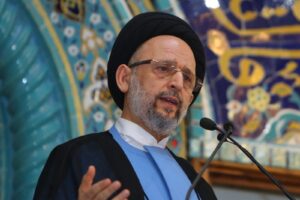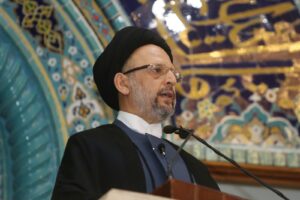Call upon Me; I will respond to you
His Eminence, Sayyed Ali Fadlullah, delivered the two Friday prayer sermons at the Imamain Al-Hassanain Mosque, Zul-Hijja 9 , 1443H. – July 8, 2022. Several prominent religious scholars, dignitaries and believers attended the Jumu’a prayer. Following is the edited text of the two sermons:
The first sermon
Call upon Me; I will respond to yo
Allah, The Most Exalted, says in His Glorious Book: And your Lord says, “Call upon Me; I will respond to you.” Indeed, those who disdain My worship will enter Hell [rendered] contemptible. Allah, the Most Exalted says the truth.
One of the favors, Allah, The Most Exalted, has bestowed on His servants, and the one, which we should thank Him for (like all others), is when He permitted them to call and pray to Him. He permitted them to ask Him for their needs and tell Him about their concerns and problems without any intercession or berries. He also promised that He would respond to them, irrespective of whether the caller is young or old, rich or poor and pious or dissolute.
Imam Ali (a.s.) pointed out the significance of this favor in his will to his son, Imam Al-Hassan. He said: Know that He Who owns the treasuries of the heavens and of the earth has permitted you to pray to Him and has promised you acceptance of the prayer. He has commanded you to beg from Him in order that He may give you and to seek His mercy in order that He may have mercy on you. He has not placed anything between you and Him that may veil Him from you Him.
Hadiths, too, have talked about the effects of the Dua– Supplication. The Messenger (p.) says, Shall I show you a weapon, which will save you from your enemies and cause God’s providence to flow upon you?’ Those who were present said, ‘Yes!’ and he said, ‘To call upon your Lord day and night, for the weapon of the believer is supplication. The Messenger (p.) also says, “There is no Muslim who offers a Dua, through which no sin or severing of family ties is found, that won’t be given by Allah one of three things in return: either He will answer his du’aa soon, or he will store it up for him in the Hereafter, or He will divert an equivalent evil away from him because of it”.
Moreover, Dua is not restricted to difficult or crucial things. One can pray to God for anything. The Hadith says that God told Musa to ask Him for anything, even the fodder for his sheep and the salt for his dough. Another Hadith says that one should not belittle any of his needs, for the believers who ask are among the most beloved by God.
But when Allah, The Most Exalted, urges the believers to ask Him, it does not mean that they should make no effort to achieve what they are asking for. Dua is not a substitute for work. Answering it takes place when man does all he can to attain what he is supplicating for. That is why the Hadith says: the prayers of these four are not answered:
1) the one who sits at home and expects that Allah will give him sustenance. Allah, The Most Exalted, would say to him: didn’t I ask you to go out in the search of sustenance?
2) The one who would ask for the punishment of his wife. Allah, The Most Exalted, would say to him: didn’t I give you the right to divorce her?
3) The one who would spend his resources in an inappropriate way and ask Allah for sustenance. He would be told by Allah, The Most Exalted: didn’t I ask you to observe moderation and correct your ways?
4) The one who has given out loan without a witness, Allah, The Most Exalted, would say to him : Didn’t I command you to have witnesses?
Thus, Allah, The Most Exalted, will not respond to the Dua of the people who sit in their homes, waiting for Allah, The Most Exalted, to sustain or support them. He will say to them: do your part and I will help you to achieve what you are asking for.
Furthermore, God said that the Dua can be at any place or time, but there are certain times and places that He promised that He would be more responsive in them, such as those standing on the mount of Arafa or those who remain in their country, having not been successful to join them.
The Prophet (p.) said: “There is no day on which Allah sets free more slaves from Hell than He does on the Day of `Arafah. He (Allah) draws near, then He boasts of them before the Angels saying: What do these want?” O My Angels, bear witness that I have forgiven them.
Therefore, dear loved ones, we are called upon in this day to raise our hands and supplicate with pure hearts and tongues asking for our needs, which should not be confined to our needs in this world, as it should be coupled with our needs in the afterlife. We should ask God for piety and following the straight path, He has drawn for us.
Let us seize the opportunity of this noble day to ask Allah, The Most Exalted, with all our hearts, to give us all what we need in this life and in the Hereafter, and to guide and help us in doing all what pleases Him. Let us also not forget the poor, the needy and the orphans, as well as those who are struggling in the fields of knowledge and Jihad to ensure that the word of God is the highest. May Allah, the Most Exalted, help us to contribute in feeding those who are hungry, treating those who are sick and supporting those who are wronged…
The second sermon
Worshippers of Allah, The Most Exalted, I advise you and myself with the advice of Imam al-Baqir, whose death anniversary was on the seventh of Zil-Hijjah, when he said to one of his companions:
Convey my greetings to our followers …
And advise them to fear Allah, the Magnificent. Tell them that their rich should sympathize with the poor, and the strong should sympathize with the weak. They should attend the funerals of their dead and visit one another, for their meeting keeps our cause alive that gather all people. And their main concern is Islam in all its doctrines, rulings, values, and morals…
Dear loved ones: we are in a dire need of these pieces of advice that call on us to cooperate and to support one another, to be pious and committed to justice and not to call for what is against it in our actions, behavior, and stances. By this, we would be loyal to the Imam and become more responsible and just and more capable of facing challenges…
We begin with the economic burdens the Lebanese can no longer tolerate, the last of which was the new communication tariff that will add to their misery as they try to buy food, water, fuel, electric power, transport and so on. At the same time, the crisis of the shortage in bread and flour that has aggravated, exposing the greed of some of those who are supposed to be more merciful and are entrusted with people’s bread and needs, in addition to the nearly total blackout that have even hit the airport in the middle of the high season..
Nevertheless. the government, which is supposed to be responsible for the country has done nothing to secure the people’s needs and stop the drainage that is depleting their resources and savings, leaving them with no choice other than depending on themselves, or relying on the aid provided by individuals, institutions, parties or immigrants.
Although we highly appreciate this cooperation and solidarity among the Lebanese, which we hope that it continues and increases, it does not constitute a solution, as it only reduces the suffering and barely enables the people to survive. The only solution is for the government to shoulder its responsibilities at all levels and reactivate its administration and institutions…
We still believe that the government is not poor and that it is able to run its affairs and those of the citizens, if those in power decide to forego their personal differences, sectarian interests, and the other barriers that hinder any serious attempt for reform, and end corruption and waste, enabling the judiciary to play its role in returning the plundered money, and dismissing those who are not qualified. The government should also remove the obstacles that prevent the founding of a productive economy, and not to rely, as we are witnessing, on loans or foreign aid that will obviously not come. And even if they did, they will be associated to certain terms that might not be in the interests, or favor of the Lebanese.
It is regretful that those in charge are dealing with this tragic in the cold and indifferent way we are used to, with same the mentality that led the country to the abyss it has fallen into, as if the country is not their country and the people are not their people who elected them to their posts.
Faced by this reality, we will not despair and we will continue to bet on those who are loyal to the country and feel they are responsible for it. We will bet on the people and call them to raise their voices. And not to be satisfied by their complaints while keeping their rage bottled inside them, so that it would not be said that the Lebanese are the most angry among nations and the least in putting their anger into action…
We say to those in charge to hurry up and form a government for the Lebanese will not wait long.
Meanwhile, the resistance drones have brought back to the forefront the issue of the national wealth, after the enemy had turned its back to the Lebanese demands of their rights in their oil and gas… trying to impose a fait accompli, as it relies on the divisions of the Lebanese Leaders…
Thus, we call for unifying the Lebanese stand and dealing with the issue based on the right and the strength it possesses. We should be aware that that whenever we make a concession to the enemy, it will ask for another one and that it only understands the logic of force that has been proven effective.
Shiism does not represent a personal belonging to Ali (a.s.) and his family (Ahlelbeit (a.s.)), but it represents the belonging to the path of the Prophet (P.) that they followed, worked and struggled for. He also tells the people how to be real Shiites. He says to Jabir bin Abdallah: “Is it enough for a person to embellish himself as our Shi’a (follower) by professing love for us, the Ahlelbeit? Nay! By Allah, a person is not our follower unless he fears Allah and obeys Him. Our followers are only recognized, O Ja





